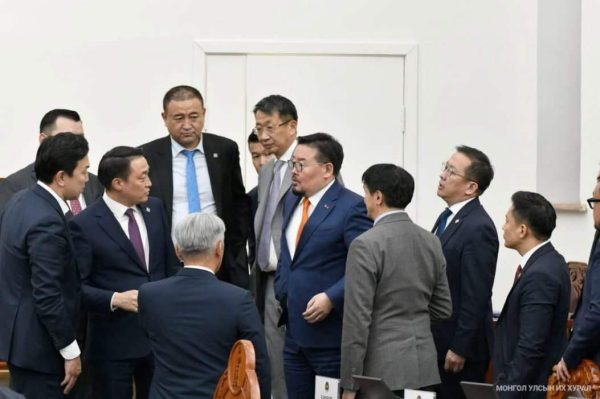Amarbayasgalan Dashzegve (left, wearing a purple tie) and Gombojav Zandanshatar (right, orange tie) speak in the State Great Hural, in a photo taken three months prior to Zandanshatar’s appointment as Mongolia’s prime minister on June 13.
In the late summer and early fall of 2025, Mongolia’s political terrain shifted with the force of a Gobi desert storm. The country’s dominant ruling party, the Mongolian People’s Party (MPP) – a fixture in power for most of the past two decades – descended into a bitter leadership battle, while its main rival, the Democratic Party (DP), emerged from months of disarray to anoint a new, reform-minded chairman.
These twin developments, unfolding against a backdrop of economic stagnation, systemic corruption, and growing public anger, are not mere political theater: they signal a potential realignment of power in Ulaanbaatar, with ripple effects for Mongolia’s delicate balancing act between China, Russia, and the United States. For a nation long lauded for its “managed succession” in post-Soviet democracy, 2025 marks a turning point – one that could either strengthen its democratic institutions or plunge it into a new era of gridlock.
The Democratic Party’s Reboot: Tsogtgerel Odon’s Rise to the Helm
For years, the DP has lingered in the MPP’s shadow. As Mongolia’s largest opposition party, it holds 42 seats in the 126-member State Great Hural (Parliament) – a respectable showing, but far short of the MPP’s 68-seat majority. Plagued by internal factionalism and unable to capitalize on public frustration with the MPP’s handling of the economy and corruption, the DP risked becoming a marginal player.
That changed on August 31, 2025, when its National Policy Committee elected Tsogtgerel Odon as chairman, ending months of uncertainty following the resignation of former leader Gantumur Luvsannyam.
Tsogtgerel’s victory was decisive. In the first round of voting, the 48-year-old secured 196 votes out of 314 participating committee members – crushing rivals Purevdorj Bukhchuluun (82 votes), Bayarmaa Judag (33 votes), and Otgonbat Barkhuu (3 votes).
Continue Reading on The Diplomat
This preview shows approximately 15% of the article. Read the full story on the publisher's website to support quality journalism.
